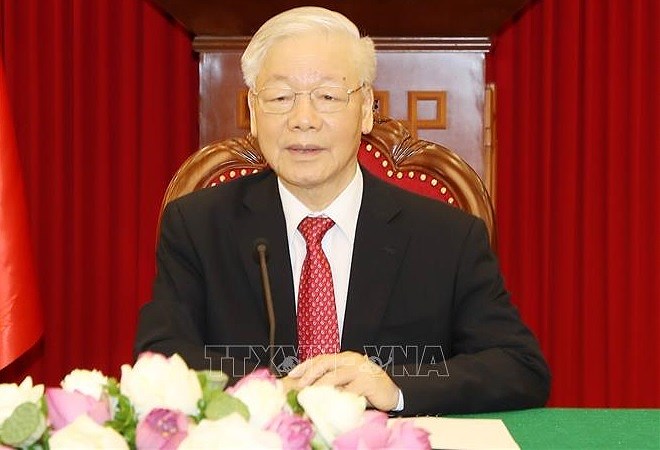Canadian scholars have highly appreciated the thoughts that General Secretary of the Communist Party of Vietnam Nguyen Phu Trong had mentioned in his recent article entitled “A number of theoretical and practical issues on socialism and the path towards socialism in Vietnam”.
 General Secretary of the Communist Party of Vietnam Nguyen Phu Trong (Photo: VNA)
General Secretary of the Communist Party of Vietnam Nguyen Phu Trong (Photo: VNA)– Canadian scholars have highly appreciated the thoughts that
General Secretary of the Communist Party of Vietnam Nguyen Phu Trong had mentioned in his
recent article entitled “A number of theoretical and practical issues on socialism
and the path towards socialism in Vietnam”.
They said that the article has raised a number of issues with
broad and diverse connotations on both theoretical and practical basis, and
emphasised that the socialism mentioned in the article is scientific socialism
based on the Marxist-Leninist doctrine in modern times.
Professor Julie Nguyen, President of the Canada - ASEAN
Initiatives at York University, said that the article showed the heart of
the leader who has deep concern for the people and the wish of leaving no one
behind, especially in the context that the country is still poor and has to
compete economically with the outside world. This is a decisive factor ensuring the people's support to the Party, she stressed.
According to the professor, a socialist-oriented market
economy is the right way for leaders to achieve the goal for the people.
She expressed interest in the Vietnamese Party chief’s
opinion stating that a fundamental characteristic and important feature of the
socialist orientation in the Vietnam’s market economy is the combination of
economy and society, the coordination of economic and social policies, and the economic
growth being accompanied by social progress and equality in every stage, every
policy, and throughout the development process.
Trong’s highlighting the importance of social policies in
the socialist-oriented market economy is of special significance in human and
human resource development to build the country, and is a strategic direction
for the future of the country and the happiness of the people, Julie Nguyen
said.
Meanwhile, Luis Silva, an expert on government relations, suggested
Vietnam recognise the accompanying rewards and risks as the country seeks to
achieve more social and economic progress for its people.
According to the expert, Vietnam has demonstrated how is
well-equipped the country is in managing a public health crisis that has
gripped the entire world with the outbreak of COVID-19. By applying
evidence-based, scientific and technological solutions in the fight against
COVID-19, Vietnam has positioned itself as an ideal place in East Asia to
attract more investments from the scientific and technological industries in
the future as the world slowly emerges from the pandemic.
The opportunities for greater investments in the Vietnamese
economy by these industries will provide better standards of living for the
Vietnamese people and more prosperity for Vietnam, he said.
Silva noted the potential risks of nationalist governments
withdrawing from trade agreements in the future can pose a serious threat to
the international investments made in Vietnam, and thus hamper Vietnam’s
economic prosperity.
Vietnam can minimise the threat of this potential disruption
by diversifying and expanding the number of international trade agreements with
more countries, he suggested./.